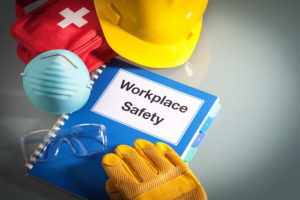
If you’re injured on the job, you’ve probably been told that the only compensation you can get will come from workers’ compensation insurance held by your employer. While this is generally true, there are other times when you can sue for personal injury compensation as well. Learn more about how workers’ comp and personal injury claims can sometimes overlap.
Workers’ Comp
Usually, if you’re injured on the job, you’ll file a workers’ comp claim. Workers’ compensation is insurance your employer carries for this reason. You don’t need to show proof of fault for a workers’ comp claim. You simply need to show that your injury occurred on the job and is somehow connected to your work. Under workers’ compensation, you get non-taxable income that equals about two-thirds of your average pay. You’ll also get compensation for your medical care and permanent injury.
Personal Injury Claims
If you’re injured due to the negligence of another person, you can file a personal injury claim. However, in order to recover damages, you have to prove your injuries and show that the other person was at fault. Personal injury settlements typically include compensation for lost wages, loss of future earnings, medical expenses, and property damage. Occasionally, compensation can also include pain and suffering.
Areas of Overlap
While workers’ comp and personal injury usually handle two different groups of people, there are times when the two will overlap. In these cases, injured workers might be able to file a workers’ comp claim and a personal injury lawsuit. For example:
- If a defective product injures you on the job, you might be able to sue the manufacturer of that product.
- If your employer isn’t required to carry workers’ comp, or is required but hasn’t done so, you might be able to sue your employer.
- If your employer or a fellow employee injures you because of intentional misconduct, you might be able to file a personal injury lawsuit.
- If negligence of a third-party caused your injuries, you might be able to file a personal injury claim against them.
- If your injury involves a toxic substance, you might be able to sue the manufacturer of that substance.
Injuries That Happen Away From the Workplace
Workers’ comp only handles injuries that happen when you’re on the job. Any injuries that occur outside of your job don’t fall under workers’ comp. Lunch breaks and commuting to and from your work site are considered non-work related duties. However, that doesn’t mean the injury has to happen only at the workplace. For some employees who work away from their offices, such as construction workers or letter carriers, workers’ comp will also handle any injuries they receive doing their job.
A slip and fall, dog bite, or car accident are examples where personal injury lawsuits can cover injuries that happen on the job and there is still negligence by another person.
Tips For Staying Safe At Work
Regardless of what your job may be, staying safe at work should be a priority in everyone’s minds. In order to make the most out of your job and work life, it is important to reduce your risk of injury and illness at work. Below are some tips to help you stay safe at work:
Understand the risks
If you know and understand the particular hazards of your job or workplace, you can take the necessary precautions to reduce your risk of work-related injuries or illness.
Reduce your stress
Although this may be hard, reducing your stress level at work can help in many ways. Common causes of stress may include long hours, heavy workload, job insecurity, or conflicts with coworkers and bosses. Stress can ultimately lead to depression, sleeping difficulties and problems concentrating.
Take regular breaks
Taking small breaks in between long hours of work and concentration can help you to stay fresh and alert and in turn allow you to avoid injury or burning out. Schedule your most difficult tasks when your concentration is at its best, such as the first thing in the morning.
Protect your back
If you are required to pick up and carry heavy loads, keep the load close to your body and left with your thigh muscles to help avoid injury.
Stay focused
It’s important to be alert and to pay attention to your surroundings at all times. Workplace accidents happen frequently, and can often be avoided by being alert and knowing your surroundings. Watch your step to help avoid tripping over cables, wires, spills, or something mistakenly dropped on the floor. Don’t listen to music too loudly so that you’re still able to hear what is going on in your environment. Always use equipment for its intended purpose.
Dress Appropriately
Comfortable, non-slip shoes help prevent slip and fall accidents. Wear protective gear when necessary such as hard hats, safety goggles, UV shirts to prevent too much sun exposure, or gloves. If you work in front of a computer all day, consider purchasing specialized anti-glare glasses to help lessen the strain on your eyes.
Have a Safety Plan
Know what your company’s plan is for emergency evacuation or circumstances. Always be sure of the nearest exit and the safest route to it. Know who to contact in case of emergency including fire rescue and law enforcement officials. To help avoid injury, never try to handle a dangerous situation yourself without proper training.
Speak Up
If you see anything hazardous going on in your workplace, report it to your supervisor. Safety should be a priority in any workplace and your supervisor can’t address what they don’t know about. If you aren’t sure who to contact regarding safety concerns, ask your immediate
supervisor.
Skip the drinks at lunch
While some may think grabbing a beer on their lunch break is harmless, it can directly impact your safety while at work. if you aren’t properly hydrated or haven’t had enough food, one beer can cause you to be impaired potentially resulting in an accident. Instead, save the drinks for happy hour.
Know your workplace rights
There are many organizations that can offer you information and advice on workplace safety issues. Learn more at https://www.osha.gov/ Closely adhering to your company’s safety guidelines is an important part of maintaining a safe working environment. If you or someone you know has had a slip and fall or other workplace related injury, contact our team to see how we can help.
OSHA Approves Rule Protecting Workers from Silica
After over four decades of warning, new workplace limits for lung-damaging and omnipresent substance, silica, are going to take effect. Silica, which is found in rock and sand, poses a hazard when it is crushed into a fine dust and inhaled – which is a major problem on construction sites as well as an assortment of other work environments. This substance can trigger silicosis, a lung-scarring condition that kills by suffocation, in addition to lung cancer and kidney disease.
The OSHA (Occupational Safety and Health Administration) released a new standard – which replaces a rule that was set in 1971. It now reduces the allowable exposure limit to silica to 50 micro-grams per cubic meter of air, which is five times less than the current limit for construction sectors. The new rule establishes two standards – one for general industry and maritime and one for the construction industry. Under the new standards, an estimated 2.3 million employees who work in fields like construction, brick manufacturing, and fracturing will be protected. In fact, most employers will be able to meet compliance by using equipment found at local hardware stores.
Many groups that argued against the change claim the new rule is a “job-killer” that will cost much more than OSHA anticipates, however, worker-safety advocates have disputed this by saying that silica is a worker-killer and that the standard is long overdue. OSHA estimates that the rule will prevent about 640 deaths per year and more than 900 new cases of silicosis.
Read more here.
OSHA Launches Program to Protect Nursing Employees
According to surveys by the Department of Labor’s Bureau of Labor Statistics (BLS), there are over 35,000 back and other severe injuries among nursing employees every year. In terms of the numbers of these injuries, the BLS data shows that nursing assistants are injured more than any other occupation! The number one reason why so many nursing employees are getting these injuries is by doing their everyday jobs of moving and lifting patients.
It is no news that this has become an epidemic among hospital nursing staff members, but for some reason no actions have been taken – until now. The federal Occupational Safety and Health Administration (OSHA) has recently announced that they for the first time ever, they are going to crack down on hospitals to prevent an epidemic of back and arm injuries among nursing employees. Last year, OSHA sent letters to hospital administrators across the country and created a companion website, warning that nursing employees suffer high rates of injuries from moving and lifting patients. Hospitals can potentially be fined $7,000 if they do not adopt the new initiatives OSHA recommends.
Studies have proven that the “body mechanics” that are taught during nursing school are not enough when it comes to lifting a patient and will not prevent a nurse from being injured. Instead, the only way to actually prevent injury and move patients safely is by using special equipment, such as ceiling lifts – similar to that of what a factory would use to lift heavy parts. Under the new enforcement memo, OSHA’s inspectors will interview nursing staff and managers and review internal hospital documents to help nurses better understand what they should be doing to stay safe in hospitals.
OSHA is finally on-board to help the many nursing professionals that are putting their bodies in harm’s way each day at work, and is very serious about making sure all necessary precautions are being taken. OSHA wants to send an important message to these workplaces and make sure that nurses and other hospital members are staying safe. To learn more about this recent program OSHA has launched, click here.
Contact Us:
If you have experienced injuries from being a nurse, or have experienced injuries from any job, contact David Singer & Associates today and learn more about what our team of attorneys can do for you.



